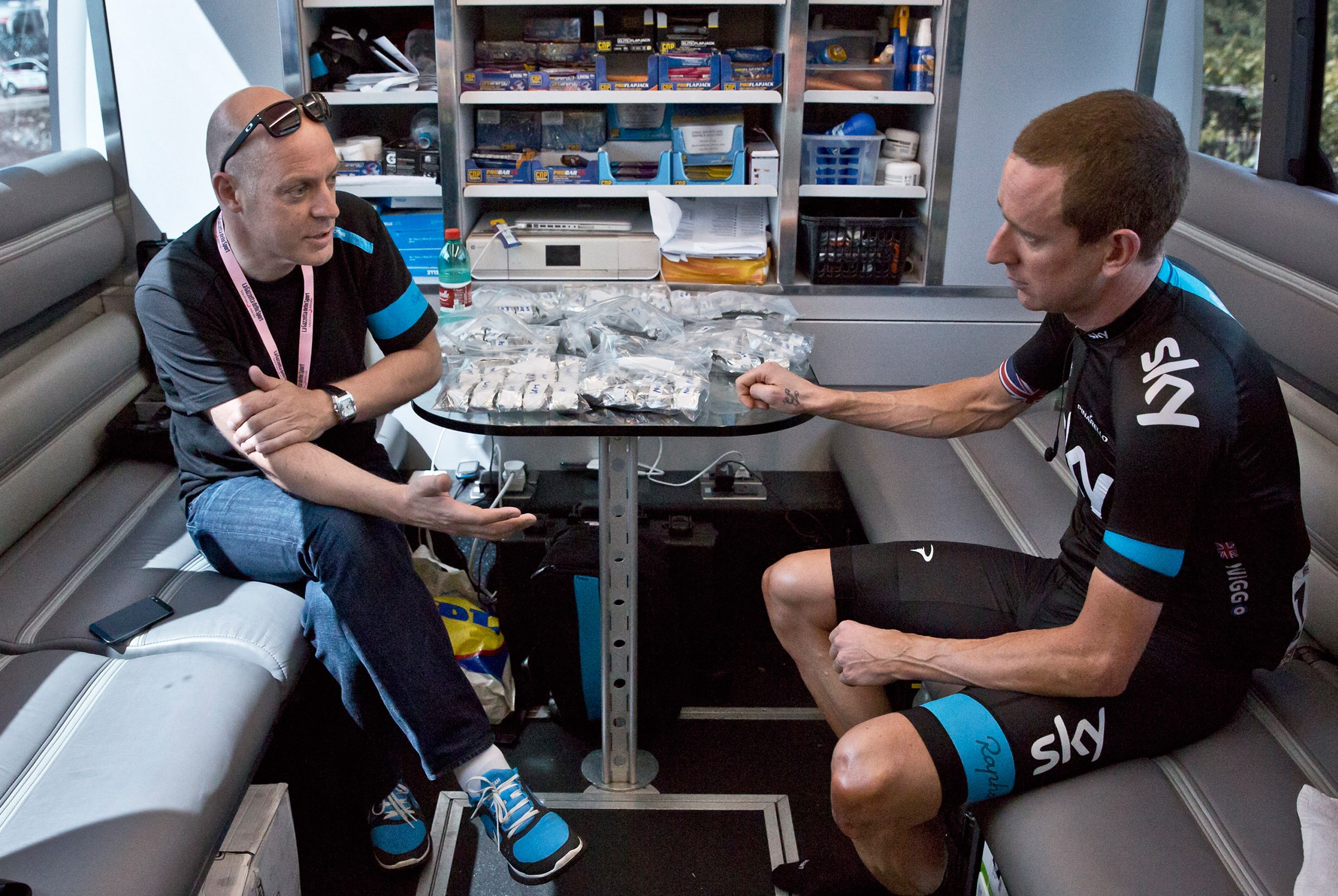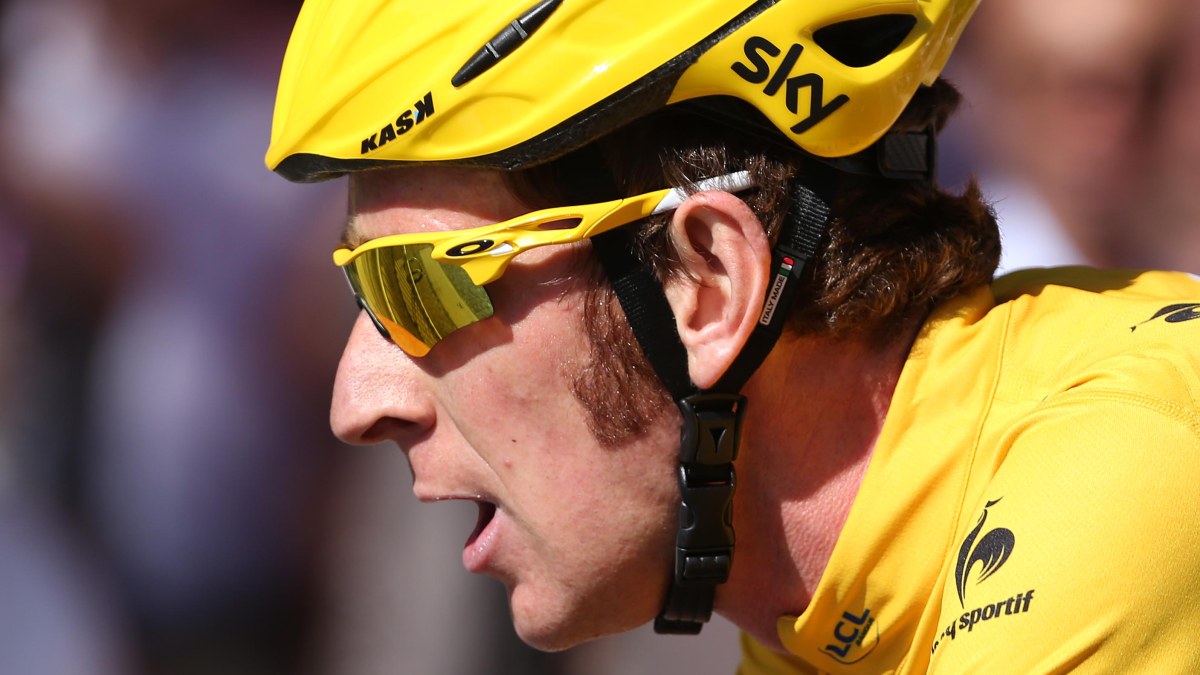In 2013 Chris Froome told a story about Bradley Wiggins that’s never gone away. Wiggins had won the Tour de France in 2012, Froome the following year. Soon after his victory, Froome explained why he hadn’t wanted Wiggins in the Team Sky squad for the 2013 race. He felt Wiggins didn’t contribute enough to the team. As well as that, the two were hardly speaking. The team boss, Sir Dave Brailsford, understood which way the wind was blowing and sided with Froome. Wiggins was sent to the Giro d’Italia.
Froome’s take on his team-mate was nuanced. He lamented Wiggins’s reluctance to engage properly with his team-mates but liked the funny guy who made everyone laugh with his clever impersonations. Wiggins’s take-offs were never mean-spirited, just brilliantly executed and side-splittingly funny.
Once he overheard Froome ask the driver Claudio Lucchini if the team bus had an alarm system, because he’d left his Oakley sunglasses on a seat. Everyone on the team knew that Froome loved his free Oakleys. For Wiggins this was low-hanging fruit. Exaggerating the trace of Afrikaans in his Kenyan-born team-mate’s accent, he regaled the entire team with Froome’s likely reaction to the bus being burgled.
“We cin survive without the 800k bus, think you, ifficer, but whit about my Oakleys? Are your min looking for them? Do you nid a discription? An artist’s skitch? I cin’t bileev this is hippinining…” Even Froome found it hilarious. Wiggins also did an excellent Brailsford impression, zoning in on the team leader’s liking for motivational speak. “The three Ps of our culture and of our team: professionalism, performance and, erm… whatever.”
The thing that bothered Froome was how reluctant Wiggins was to play himself.
I read Wiggins’s new book last week, The Chain: Think you know Bradley Wiggins? Think again. It is Wiggins’s second autobiography and very different from the first. This one is far more insightful. It is also harrowing and it explains why Wiggins couldn’t let others see who he was during his years as an elite and highly successful bike rider.
As soon as he learnt that his father, Gary, had walked out on the family, which happened when Bradley was two, he felt he’d been abandoned. Brendan became his stepdad but he and Wiggins didn’t get on. His determination to become a world-class cyclist stemmed from a desire to emulate and ultimately please the man who’d walked out on his family.
Stan was his first coach and for three years he sexually abused the teenaged Wiggins. Fearing he wouldn’t be believed and that any public airing of the abuse might derail his career, Wiggins chose to live with his secret. This would have terrible consequences, not least on his self-esteem. He hoped that by excelling on the bike he could somehow create a better life for himself, not appreciating that at some point the traumas of his past would have to be confronted.

Wiggins passing the Arc de Triomphe on his way to overall victory at the 2012 Tour de France
DOUG PENSINGER/GETTY IMAGES
The Chain is not an enjoyable read. Too much sadness and pain, but it is compelling and it certainly explains why Wiggins was more comfortable mimicking others than playing himself. The teenager clung to the hope that his dad would be impressed by what he was achieving on the bike. Then, 16 years after walking out, Gary got in touch. Wiggins agreed to meet him.
“I mentioned the plan to Simon Jones, the [Great Britain] national coach,” Wiggins wrote. “ ‘You’re 18,’ he told me. ‘Don’t underestimate the impact that meeting your dad for the first time will have on you.’ I never thought much about his words back then, but I see now how he recognised completely the psychological toll of meeting an absent parent after so long.”
What the teenager needed was his dad to say: “Son, you’ve done brilliantly. You are going to have an amazing career.” What Gary actually said was: “You’ll never be as good as your old man.”
Gary was troubled, living with alcoholism and the weight of a life not well lived. He died in Australia on January 25, 2008 at the age of 55. The police described the circumstances of his death as “unexplained”. Wiggins is sure his dad was murdered. About Gary’s passing, Wiggins wrote: “I’d be lying if, among the mixed bag of feelings I felt when Dad died, there weren’t occasional waves of relief. Dad was gone and I didn’t have to worry about him any more. I get that people who’ve never had someone deeply dysfunctional and disruptive in their lives will find it hard to understand, but there can be an element of liberation when they’re gone and you don’t have to deal with their chaos, or the spectre of their chaos, any more.
“That’s not easy to say, but it’s true. Part of me thinks I’d never have had the success of 2012 if Dad had still been alive. You need everything in your favour to win the Tour de France. Absolute focus from the minute you set out to achieve the goal is the most important element of all. My relationship with Dad would doubtless have been gnawing somewhere at the back of my mind. I say that as an observation, not as something that’s in any way important. What I mean is that, just as his existence somewhere out there had been an inspiration in my childhood, by 2008 it had become a black cloud.”

Wiggins says he made a mistake believing he had an unconditional bond with Brailsford, left
SCOTT MITCHELL/GETTY IMAGES
With its career-defining successes, 2012 should have been the happiest year of Wiggins’s life. It was far from that. He won the Tour, rang the bell at the London Olympics and then won a gold medal in the individual time-trial, but by the end of that year he had begun the descent into the darkness that comes with alcohol and a recreational drug addiction. He had looked to Brailsford as a father figure but their relationship foundered. Few come out of Wiggins’s story as badly as his former Team Sky boss.
“When it came to Dave, the mistake I made was thinking the ties we had were unconditional. They didn’t seem to be. I felt I was disposable to him. I felt I could be rinsed of all use and chucked in the bin with the rest of the rubbish. Maybe I was naive to think I was different to anyone else.” It would be interesting to hear Brailsford’s take on the ending of their friendship.
The single most interesting cycling story in the book relates to the infamous Jiffy bag of 2011. For a long time the team couldn’t explain what was inside a package considered so important it was specially couriered by a British Cycling employee to the Sky team in France. The word from the team was that the package, requested by Dr Richard Freeman, was for something that would be given to Wiggins.
Eventually the team identified the product as fluimucil, a harmless over-the-counter decongestant. Wiggins doesn’t believe it was fluimucil and says he was set up by people in the team desperate to deflect attention away from themselves. “I’m not denying there was a Jiffy bag. I actually believe there was one. I also believe it wasn’t meant for a rider at Team Sky. In my opinion it contained testosterone patches and its ultimate destination was elsewhere.”
What he means by “elsewhere” is unclear but he does add that the courier was meant to take the package to the team training camp at Sestriere, Italy, but instead dropped it off in Auvergne, central France, after the final stage of the Critérium du Dauphiné. Wiggins’s belief that the package contained testosterone tallies with the fact of testosterone sachets being delivered to the National Cycling Centre in Manchester the previous month.
People may not believe Wiggins but I’m guessing that, in relation to the Jiffy bag, he knows more than he is saying. What he does say is that it was testosterone and was meant for someone in the team who was not a rider. Unfortunately no records were kept, or, if there had been, they were destroyed. “A convenient absence of data that saved some very big careers,” Wiggins says.
The book is definitely worth reading.

